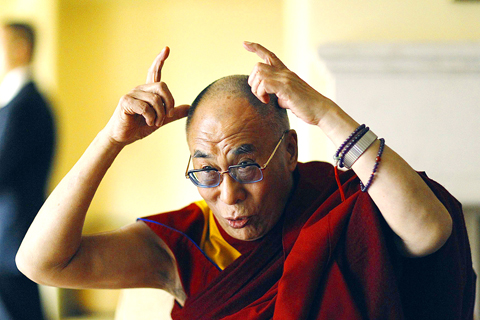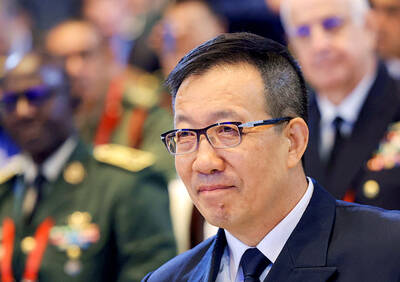The Dalai Lama said the US and other countries could help his campaign for a free Tibet by promoting an open society in China.
“Censorship ... is the source of the problem,” the exiled Tibetan spiritual leader said in an interview on Saturday in Beverly Hills.
“The Chinese people have no opportunity to know our issue,” said the Buddhist monk, who Beijing has branded as a dangerous separatist for demanding Tibetan self-determination.

PHOTO: REUTERS
“Once China becomes an open society — freedom of speech, freedom of press, freedom of information — all this unnecessary fear and doubt will reduce,” he said. “That’s the real answer for this problem.
“American can help in this change,” he said, adding that the lack of free information has helped the Chinese government portray him as a demon and a terrorist.
“Do I look like a demon?” the winner of the 1989 Nobel Peace Prize joked, holding his fingers beside his head to make devil horns.
The Dalai Lama, who was to speak on behalf of Whole Child International, an organization that works for orphans around the world, said Western search engines like Google were important to the free flow of information within China. He noted they had ceded to pressure from the Communist government there to limit what users can see.
Google last month threatened to pull out of China if the government did not agree to stop censoring its Chinese-language service.
The Dalai Lama’s visit to the Los Angeles area came on the heels of his low-key meeting on Thursday with US President Barack Obama, which upset Beijing.
Obama used his first presidential meeting with the Dalai Lama to press China to preserve Tibetan identity and to respect human rights in the region, which has been under Chinese rule since 1950.
Tibetans living near the Dalai Lama’s birthplace in northwest China celebrated the meeting with a rare display of fireworks while China, the second-largest creditor to the US, condemned the move.
The Dalai Lama was reluctant to predict what impact the meeting would have.
“We will have to wait ... it’s very difficult to predict,” he said.

DEADLOCK: Putin has vowed to continue fighting unless Ukraine cedes more land, while talks have been paused with no immediate results expected, the Kremlin said Russia on Friday said that peace talks with Kyiv were on “pause” as Ukrainian President Volodymyr Zelenskiy warned that Russian President Vladimir Putin still wanted to capture the whole of Ukraine. Meanwhile, US President Donald Trump said that he was running out of patience with Putin, and the NATO alliance said it would bolster its eastern front after Russian drones were shot down in Polish airspace this week. The latest blow to faltering diplomacy came as Russia’s army staged major military drills with its key ally Belarus. Despite Trump forcing the warring sides to hold direct talks and hosting Putin in Alaska, there

North Korea has executed people for watching or distributing foreign television shows, including popular South Korean dramas, as part of an intensifying crackdown on personal freedoms, a UN human rights report said on Friday. Surveillance has grown more pervasive since 2014 with the help of new technologies, while punishments have become harsher — including the introduction of the death penalty for offences such as sharing foreign TV dramas, the report said. The curbs make North Korea the most restrictive country in the world, said the 14-page UN report, which was based on interviews with more than 300 witnesses and victims who had

COMFORT WOMEN CLASH: Japan has strongly rejected South Korean court rulings ordering the government to provide reparations to Korean victims of sexual slavery The Japanese government yesterday defended its stance on wartime sexual slavery and described South Korean court rulings ordering Japanese compensation as violations of international law, after UN investigators criticized Tokyo for failing to ensure truth-finding and reparations for the victims. In its own response to UN human rights rapporteurs, South Korea called on Japan to “squarely face up to our painful history” and cited how Tokyo’s refusal to comply with court orders have denied the victims payment. The statements underscored how the two Asian US allies still hold key differences on the issue, even as they pause their on-and-off disputes over historical

BEIJING FORUM: ‘So-called freedom of navigation advocated by certain countries outside the region challenges the norms of international relations,’ the minister said Chinese Minister of National Defense Dong Jun (董軍) yesterday denounced “hegemonic logic and acts of bullying” during remarks at a Beijing forum that were full of thinly veiled references to the US. Organizers said that about 1,800 representatives from 100 countries, including political, military and academic leaders, were in Beijing for the Xiangshan Forum. The three-day event comes as China presents itself as a mediator of fraught global issues including the wars in Ukraine and Gaza. Addressing attendees at the opening ceremony, Dong warned of “new threats and challenges” now facing world peace. “While the themes of the times — peace and development —